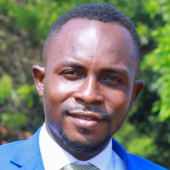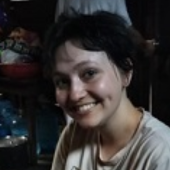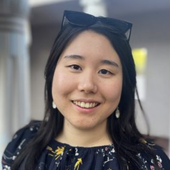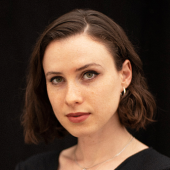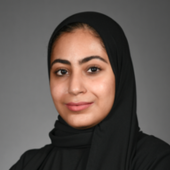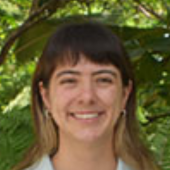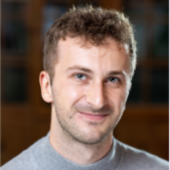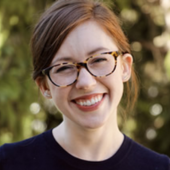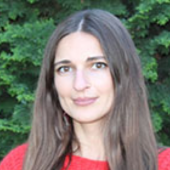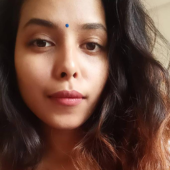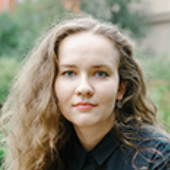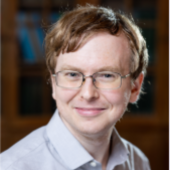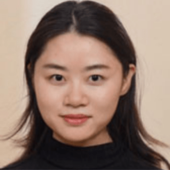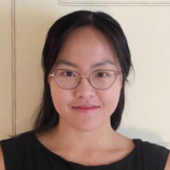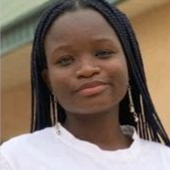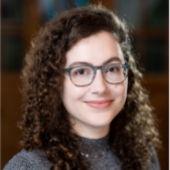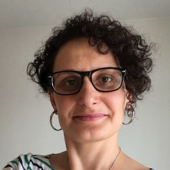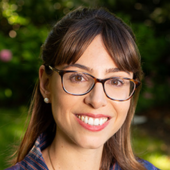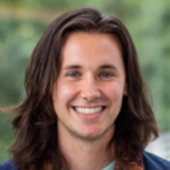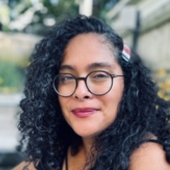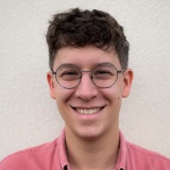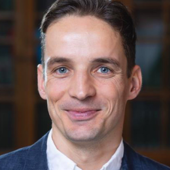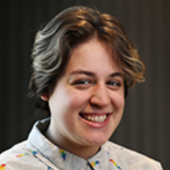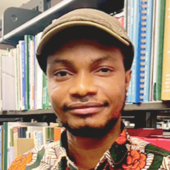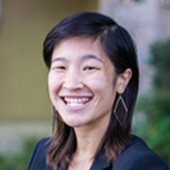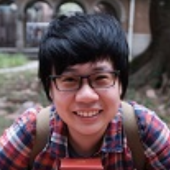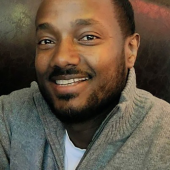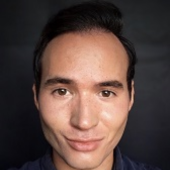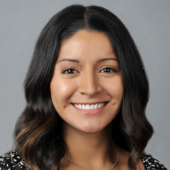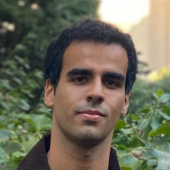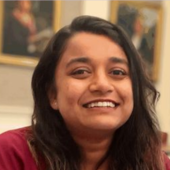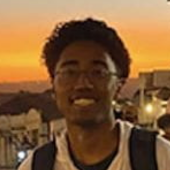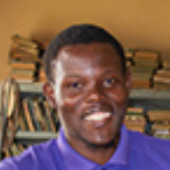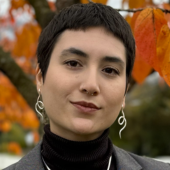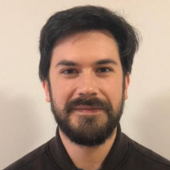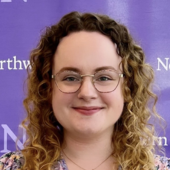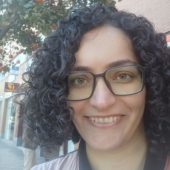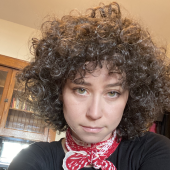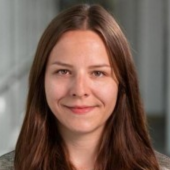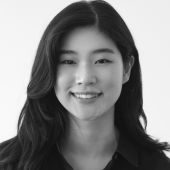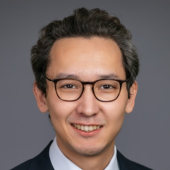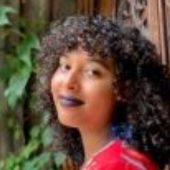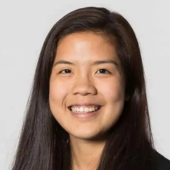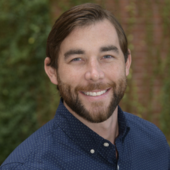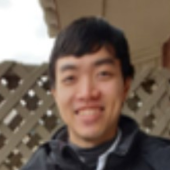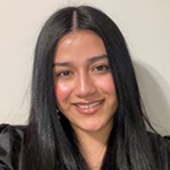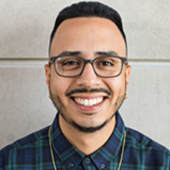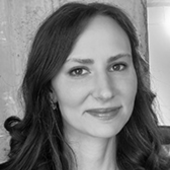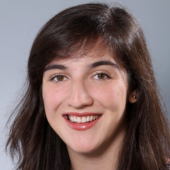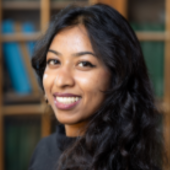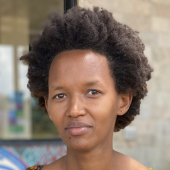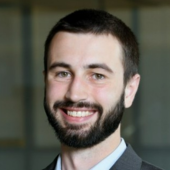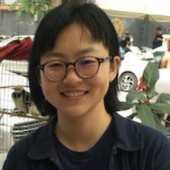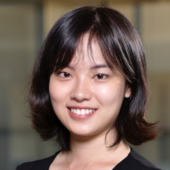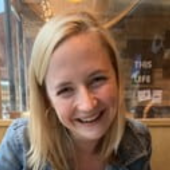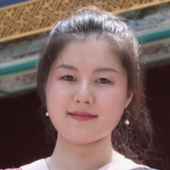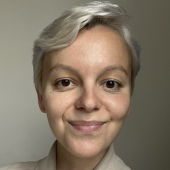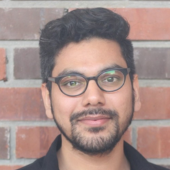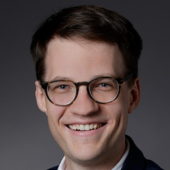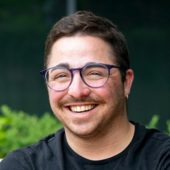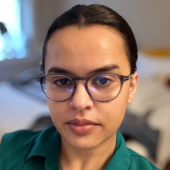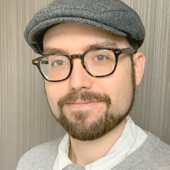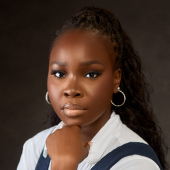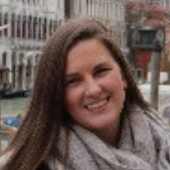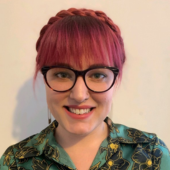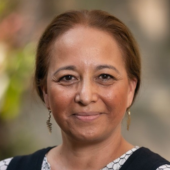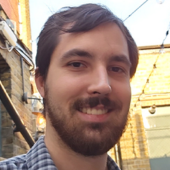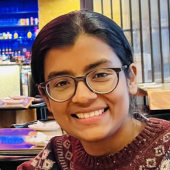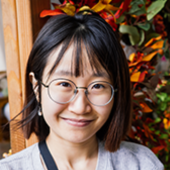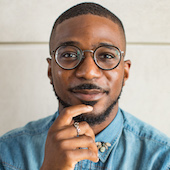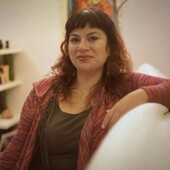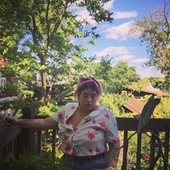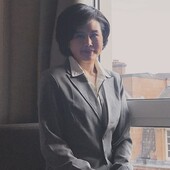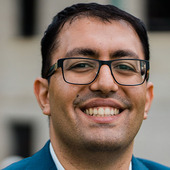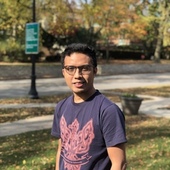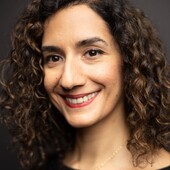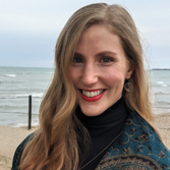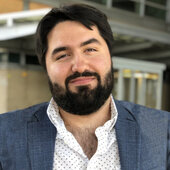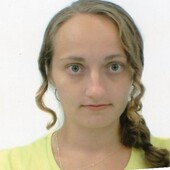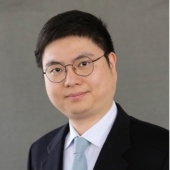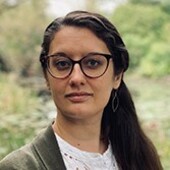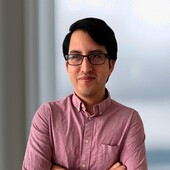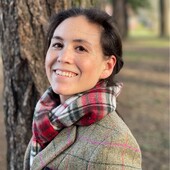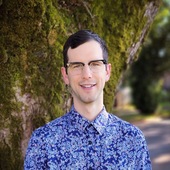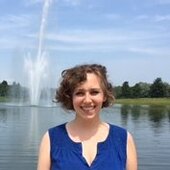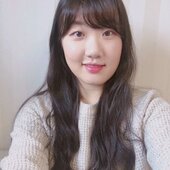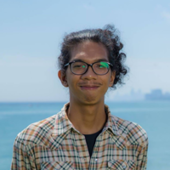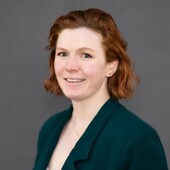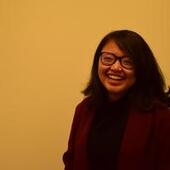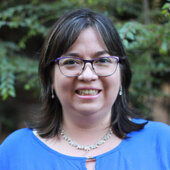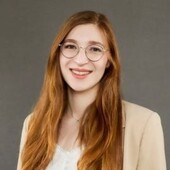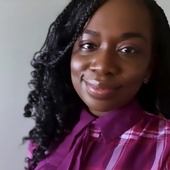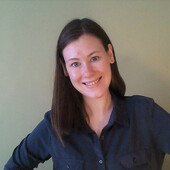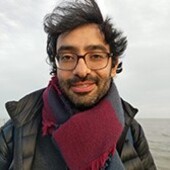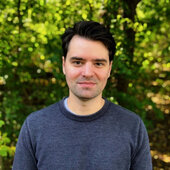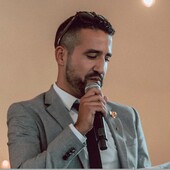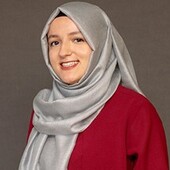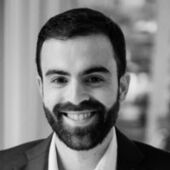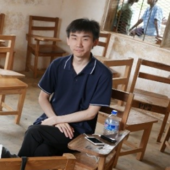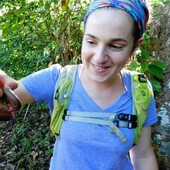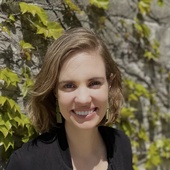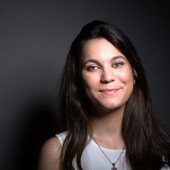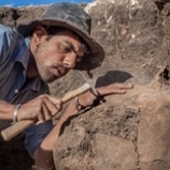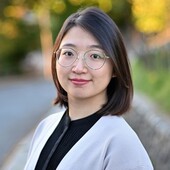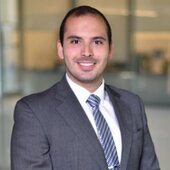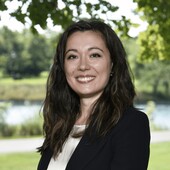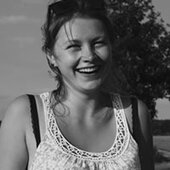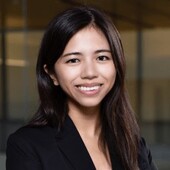International Research Awardees
Through its International Research Awards, the Roberta Buffett Institute supports Northwestern University doctoral students who are conducting research outside the contiguous United States and/or within Tribal Nations.
International Pre-dissertation Research Awards
The Roberta Buffett Institute offers International Pre-dissertation Research Awards to doctoral students in years 1–3 for exploratory research and fieldwork outside the contiguous United States and/or within Tribal Nations over the summer.2024–25
Benjamin Amartey
Communication Sciences and Disorders, School of Communications
Benjamin Amartey traveled to Ghana with the Roberta Buffett Institute’s support to conduct research for his project “Audiology in Ghana: Barriers to Effective Clinical Decision-making.” Benjamin studied the state of hearing care infrastructure and audiology as a profession in Ghana to examine how hearing disorders are assessed and treated in the country. Anna Brown
Anthropology, Weinberg College of Arts and Sciences
Anna Brown, with the Roberta Buffett Institute’s support, traveled to Mexico City and Chiapas, Mexico to conduct research for her project “Colonial Encounters and Indigenous Responses: How Lacandon Maya Peoples Navigated Conquest through Relationships with Nonhuman Animal Beings.” Anna studied at the Mensabak Archaeological Project in Chiapas to investigate how Maya peoples responded to Spanish colonialism.Jooyoung Cho
Theatre, School of Communications
Jooyoung Cho traveled to Seoul, South Korea with the Roberta Buffett Institute’s support to conduct research for their project “Embodying Compassion: Performance and the Animal Rights Movement in South Korea,” where they observed and interviewed artists and activists in the Korean animal rights movement to study its development through protests, funeral rites, theatre, and online activism. Jooyoung’s project also focuses on the movement’s overlap with women’s rights, queer rights, disability rights, and climate justice in Korea. Klaudia Cierluk
Comparative Literary Studies, Weinberg College of Arts and Sciences
Klaudia Cierluk, with the Roberta Buffett Institute’s support, traveled to Poland and Czechia to conduct research for her project “Creative Trauma, Life-Giving Poison: Literary and Visual Representations of Working-Class Women in Eastern Europe and Latin America (1940s-1980s).” Klaudia explored literary archives to study how literature represents working-class women living under authoritarian Cold War regimes and how their experiences highlight industrial environmental crises.Ca’la Connors
Anthropology, Weinberg College of Arts and Sciences
Ca’la Connors, with the Roberta Buffett Institute’s support, travelled to Douala, Cameroon to study at the Visocare Linguistic Academy and immerse herself in Cameroonian Pidgin, or Kamtok. With her project rooted in critical biocultural anthropology, Ca’la practices ethnographic methods, such as participant interviews and observation, to collect data on how Anglophone women experience and negotiate the realities of pregnancy as a socially, politically, and linguistically marginalized population.Hamideh Dorzadeh
Anthropology, Weinberg College of Arts and Sciences
Hamideh Dorzadeh traveled to Doha, Qatar with support from the Roberta Buffett Institute for her project “Displacement, Belonging, and Transnationalism: The Baloch Community in Qatar,” where she studied urban displacement and political marginalization of the Baloch people, an ethnic minority originally from Iran and Pakistan. Hamideh focused on fieldwork in residential neighborhoods in Doha where members of the Baloch diaspora live and work.Mariana Charry Esguerra
History, Weinberg College of Arts and Sciences
Mariana Charry Esguerra traveled to Sucre and Tanta, Bolivia with the Roberta Buffett Institute’s support to conduct research for her project “Sounding Indigenous Sovereignties: Musical practices and local political economies in the Bolivian Amazon (1682-1842).” She studied the process of patrimonialization, in which the musical practices of Indigenous Mojo/Moxo people represented resistance to the cultural practices of Jesuit missionaries and the colonial power of the Spanish Crown.Jacob Fortier
Political Science, Weinberg College of Arts and Sciences
Jacob Fortier traveled, with the Roberta Buffett Institute’s support, to France to conduct research for his project “The Causes and Consequences of Political Parties’ Engagement with Violent Political Organizations.” In Paris and Corsica, he studied violent and nonviolent parties within the Corsican independence movement to study interactions between political parties and radical, violent organizations in a multiparty democracy.Gillian Hemme
Theatre and Drama, School of Communications
Gillian Hemme, with the Roberta Buffett Institute’s support, traveled to Ireland for her project “Reclaiming the Body: Performances within and about Twentieth-Century Catholic Carcerality by Ireland’s ‘Fallen’ Women.” She studied feminist performance art and theatrical performance as a representation of and response to the imprisonment of Irish women in Catholic institutions for unwed mothers and women accused of sexual impropriety.Oana Delia Alexan Katz
Spanish and Portuguese, Weinberg College of Arts and Sciences
Oana Delia Alexan Katz traveled to Madrid, Barcelona, and Valladolid, Spain with support from the Roberta Buffett Institute to conduct research for her project “Genealogies Unbound: Archival Re-enchantments in Spain’s Im/material Heritage.” Through archival research and discussions with contemporary artists, she examined how artists’ works challenge nationalist, neocolonial, and racist attitudes embedded in Spain’s cultural memory of its national heritage. Prerna Khobragade
Rhetoric, Media, and Publics, School of Communication
Prerna Khobragade, with support from the Roberta Buffett Institute, traveled to India to conduct research for her project “Rhetoric of Solidarity: Mediating Anti-caste Allyship in India.” Drawing upon archival research, interviews, and her personal experience as an anti-caste activist, Prerna examined the role of upper-caste Indians in the anti-caste civil rights movement to answer questions about the role of oppressor-class individuals in anti-oppression movements.Ekaterina Kulinicheva
Art History, Weinberg College of Arts and Sciences
Ekaterina Kulinicheva, with support from the Roberta Buffett Institute, traveled to Tashkent, Uzbekistan to conduct research for her project “An Empire of Wearable Experiments: Textiles and Politics in Early Post-revolutionary Russia and Uzbekistan,” where she examined early Soviet mass-produced textiles to study the intersections of art, social life, economics, and revolutionary politics in the former Russian Empire.Daniel Loebell
Political Science, Weinberg College of Arts and Sciences
Daniel Loebell traveled to Kathmandu, Nepal with support from the Buffett Institute to conduct research for his project “Private but Hegemonic Intent: Domestic Responses to Multinational Corporations in the Indo-Pacific.” He conducted interviews with Nepalese government officials and business leaders to study responses to hegemonic power of Indian and Chinese multinational corporations operating in Nepal.Yifan Mao
Economics, Weinberg College of Arts and Sciences
Yifan Mao traveled to China with support from the Roberta Buffett Institute to conduct research for her project “The Bureaucratic Origin of the Chinese Communist Party’s State Capacity.” In order to study how state capacity facilitates economic growth, Yifan worked to digitize records of 1950s local bureaucratic expansion of the Chinese Communist Party and create the first comprehensive database of sub-county-level bureaucrats.Ngoc Thao Nguyen Bui
Economics, Weinberg College of Arts and Sciences
Ngoc Thao Nguyen Bui, with the Roberta Buffett Institute’s support, traveled to Ho Chi Minh City, Vietnam to conduct research for her project “Adaptations to Urban Flooding in Ho Chi Minh City.” She conducted preliminary surveys of residents’ views on recent floods to understand how individuals in flood-prone cities perceive and respond to risk, how government adaptation measures shape their beliefs, and how policymakers can encourage proactive decision-making.Uchechukwu Oguchi
History, Weinberg College of Arts and Sciences
Uchechukwu Oguchi traveled to Enugu, Nigeria with the Roberta Buffett Institute’s support to conduct research for her project “The Creation of a Fueling Frontier: Coal and the Birth of the Nigerian State.” Through Geographic Information System analysis, local interviews, and archival research, she studied the history of coal mining in Enugu and its role as the fuel for British colonial expansion in Nigeria. She also explored how the legacy of Enugu’s coal influences political rhetoric in the energy industry today.Racheal Oyundoyin
Anthropology, Weinberg College of Arts and Sciences
Racheal Oyundoyin, with the Roberta Buffett Institute’s support, traveled to Nigeria to conduct research for her project “Culinary Practices and Social Identity in the Oyo Empire During an Atlantic Period,” where she studied evolving culinary practices and cuisine as a representation of inequality and social hierarchies in the Oyo Empire. The project focused on food as an expression of social identity in a stratified society characterized by participation in the Atlantic slave trade. Ana Luiza Vedovato Rodrigues
Political Science, Weinberg College of Arts and Sciences
Ana Luiza Vedovato Rodrigues, with support from the Roberta Buffett Institute, traveled to Rio de Janeiro, Brazil to conduct archival research for her project “Fighting for Recognition: the Latin American Roots of International Sovereignty,” where she studied how international sovereignty norms were influenced by 19th-century Latin American independence and state formation.Maria Villareal
Earth, Environmental, and Planetary Sciences, Weinberg College of Arts and Sciences
Maria Villareal, with support from the Roberta Buffett Institute, traveled to Guam to conduct research for her project “Multiscale Approach to Understanding Submarine Groundwater Discharge in Small Karst Island Hydrology,” where she examined the hydrogeology of Guam as an example of a coastal karst aquifer. She used hydrological, geological, and chemical measurements to better understand water security, groundwater access, and sustainability in small island environments.2023–24
Livia Arantes
Radio, Television, and Film, School of Communication
Livia Arantes traveled to Brazil with the Roberta Buffett Institute’s support to conduct research for her project “For a Queer Streaming TV: Lesbian Representations in the Americas.” Livia interviewed showrunners, writers, directors, and actresses working in the Brazilian TV industry to investigate creative decision-making processes behind the representation of lesbian characters on streaming platforms.Julia De Oliveira Callegari
Human Development and Social Policy, School of Education and Social Policy
Julia De Oliveira Callegari, with support from the Roberta Buffett Institute, traveled to Brazil to conduct research for her project “The impact of ethnic-racial identity school-based learning on students’ cognitive and developmental processes: a qualitative examination of the Brazilian educational landscape,” where she interviewed students and teachers from a variety of ethnic and racial backgrounds to observe their views on and responses to racial inequity in Brazilian schools.Matthew Drew
Religious Studies, Weinberg College of Arts and Sciences
Matthew Drew, with the Roberta Buffett Institute’s Support, traveled to Chengdu and Xining, China to conduct research for their project “Politics of Prophecy: Monasteries, Cosmology, and Statecraft in the 13th Dalai Lama’s Tibet.” Through interviews with Tibetans in Chengdu and archival study of the 13th Dalai Lama’s monastic regulatory documents, Matthew explored the question of how history should understand this Dalai Lama’s monastic reforms and religio-political efforts to establish Tibet as an independent state.Alejandra Frausto
Learning Sciences, School of Education and Social Policy
Alejandra Frausto, with support from the Roberta Buffett Institute, traveled to Chile to conduct research for the project “Sentir-Pensar-Actuar: Expanding Interpretative Power in Science Education for Latine Diaspora.” Alejandra visited schools, designed a workshop, and collaborated with Chilean science educators to investigate how educational practice can be redesigned to focus on Latin American perspectives and remove US hegemonic interests embedded in science education.Arne Holverscheid
Political Science, Weinberg College of Arts and Sciences
Arne Holverscheid traveled to Germany with support from the Roberta Buffett Institute to conduct research for his project “Far-Right Normalization & Social Media.” Through examinations of far-right online communities, Arne focused on the emergence of the AfD party in Germany as a representation of the ways social media platforms allow social norms to shift and permit greater acceptance of far-right ideologies in liberal democracies.Matej Jungwirth
Political Science, Weinberg College of Arts and Sciences
Matej Jungwirth traveled to the Czech Republic with the Roberta Buffett Institute’s support to conduct research for his project “Thinking About Going Back Home in War: Ukrainian Refugees in the Czech Republic.” Matej conducted a survey, which aimed to understand how people displaced by war weigh whether to return home or to politically integrate into a new society, of some of the 500,000 Ukrainian refugees who applied for Temporary Protection status in the Czech Republic.Maria Katsulos
History, Weinberg College of Arts and Sciences
Maria Katsulos traveled to Paris, France with support from the Roberta Buffett Institute to conduct research for their project “Mental and Marial: Transmasculine Identities, Sex Work, and Warfare in Early Modern France” where Maria, through archival research, addressed the history of transmasculine identity in early modern Europe. They focused on judicial and social responses to “cross-dressing,” as well as the motivations for expressing masculine identities, which included economic opportunity, sex work, and military service.Eli Kuto
Anthropology, Weinberg College of Arts and Sciences
Eli Kuto traveled to Ghana with the Roberta Buffett Institute’s support to conduct research for his project “An Archaeological Investigation of Food Security and Storage in Northeastern Ghana.” Eli examined preserved rock-shelter granaries along the Gambaga escarpment to study food storage technologies and socio-economic food accessibility during times of Indigenous political control, colonial rule, and today.Michelle Lee
Sociology, Weinberg College of Arts and Sciences
Michelle Lee, with the Roberta Buffett Institute’s support, traveled to London, United Kingdom to conduct research for her project “Refugee Capital: How Market Actors Intervene in Worker Precarity in the Refugee Digital Labor Market,” where she explored the precarity of digital labor, worker rights, and civil protections for refugees in the UK. Michelle conducted ethnographical observation of and interviews with leasers at a platform company that connects refugees with clients in need of digital labor.Meng-rung Lin
Anthropology, Weinberg College of Arts and Sciences
Meng-rung Lin, with support from the Roberta Buffett Institute, traveled to Taiwan to conduct research for her project “Going Green with Nuclear? The politics and values of nuclear energy in energy transition in Taiwan.” Through ethnographic fieldwork among residents of New Taipei City, near three nuclear power plants, Meng-rung studied the history of nuclear energy in Taiwan, its stagnation since 1985, and the sociopolitical impacts of Taiwan’s infrastructural future, nuclear development, and green energy debates. Behailu Shiferaw Mihirete
Communication Studies, School of Communication
, with support from the Roberta Buffett Institute, traveled to Ethiopia to conduct research for his project “The political rhetoric of Adwa Victory Memorial.” Behailu studied Ethiopia’s political cultural by studying the Adwa Victory memorial and its role in representing the contested historical and colonial legacy of the emperor Menelik II. Emerson Murray
Political Science, Weinberg College of Arts and Sciences
Emerson Murray, with the Roberta Buffett Institute’s support, traveled to London, Oxford, and Manchester, United Kingdom to conduct research for his project “The Last Dominion: Settler Colonial Lineages of the British ‘Nation’-State,” where he focused on contemporary trends in British politics regarding immigration policy and the Brexit referendum. Emerson observed trends of British Conservative leaders taking inspiration from former imperial Dominions, like Canada and Australia, in attempting to reinvent a “pure” British national identity for the post-imperial world.Valeria Chavez Roncal
Music Education, Bienen School of Music
Valeria Chavez Roncal traveled to Lima, Peru with the Roberta Buffett Institute’s support to conduct research for her project “Contemporary Production, Performance, and Circulation of Peruvian Cumbia Music.” Valeria explored how cumbia music, originally from Colombia but popular in Peru’s commercial music industry, has fused with the local musical practices of rural Andean and Amazonian communities who migrated to Lima.Angad Singh
English, Weinberg College of Arts and Sciences
Angad Singh traveled to India, the United Kingdom, and Canada with the Roberta Buffett Institute’s support to conduct research for his project “Punjab: Region, History, Gender, Sexuality.” Through research across the Urdu, Punjabi, Hindi, and English languages, Angad assembled an archive of the pre-colonial, colonial, and postcolonial history of gender and sexuality in South Asian Punjab region. He focused on sexuality in both Pakistan and India as representations of nationalism and religious identity. Mounica Sreesai
Anthropology, Weinberg College of Arts and Sciences
Mounica Sreesai traveled to Visakhapatnam, India with support from the Roberta Buffett Institute to conduct research for her project “Gender and Unions: Women, Labor, and Politics in Visakhapatnam.” Through ethnographic research and interviews with female labor activists and union leaders in Visakhapatnam, Mounica investigated the role of women in India’s labor movements and trade unionism in the face of growing masculinization in unionized industries.Aaron Wilford
History, Weinberg College of Arts and Sciences
Aaron Wilford, with the Roberta Buffett Institute’s support, traveled to London and Birmingham, England to conduct research for the project “Abolition and Agriculture in the Yoruba Black Atlantic, 1807-1893.” Aaron’s archival research investigated how British colonial rulers managed the Yoruba diaspora, abolitionist movements, migration, and changing markets for West African agricultural goods.International Dissertation Research Awards
The Roberta Buffett Institute offers International Dissertation Research Awards to doctoral students in years 3–6 who are conducting research outside the contiguous United States and/or within Tribal Nations for their dissertation.2024–25
Semiu Adegbenle
History, Weinberg College of Arts and Sciences
Semiu Adegbenle, with the Roberta Buffett Institute’s support, traveled to Germany, France, and Italy to conduct research for his project, “Togolese and Yoruba: Boundary Work and Identity Politics in an Ethnic Frontier, 1762–2009.” Semiu examined how Togolese Yoruba, also known as Ife-Togo, navigate, adopt, and contest Yoruba identity across different historical periods, focusing on the Atlantic slave trade, colonialism, and postcolonial nation-building.Alexander Barna
History, Weinberg College of Arts and Sciences
Alexander Barna, with the Roberta Buffett Institute’s support, took his research on “Thinking with History: Historical Consciousness and Political Praxis in the Modern Arab World” to Cairo, Egypt. Alexander’s findings contest a general scholarly oversight of the complexity of the Arab world’s transition from empire models to nation-states, citing that a more nuanced consideration and rejection of non-nationalist political alternatives informed the widespread conversion.Julia Barr
History, Weinberg College of Arts and Sciences
Julia Barr traveled to London, Nottingham, and Liverpool to conduct research for her project, “Island of Migrants: Overseas and Intra-Island Migration Across Twentieth-Century Britain,” with support from the Roberta Buffett Institute. Julia sought to research the experiences of different mobile populations across England, Wales, and Scotland, namely the structural factors shaping their migrations, the ways in which a given locale distinguished different populations, and how resource availability and interactions with one another influenced settlement and the experience of dislocation.Eva Rubens Celem
Communication Studies, School of Communication
With the Roberta Buffett Institute’s support, Eva Rubens Celem traveled to various locales across Brazil to conduct research for her project “Imagining a New Democratic Horizon: Brazilian Women’s Contributions to Democratic Theory and Practice.” Eva sought to examine the way emancipatory social movements contend with and navigate through the unfolding global democratic crisis, focusing on intersectional women’s movements in Brazil and their contributions to contemporary democratic theory and practice.Kai Chase
History, Weinberg College of Arts and Sciences
Kai Chase, with the Roberta Buffett Institute’s support, traveled to Puerto Rico for their project, “Conservation Nation: Settler Properties, Boricua Sovereignties.” Kai, as a part of their research, aims to disseminate findings to local communities in Puerto Rico.Sebastian Poblete Coddou
Economics, Weinberg College of Arts and Sciences
Sebastian Poblete Coddou traveled to Chile with support from the Roberta Buffett Institute to expand on his project, “Union Bargaining Schemes in the Presence of Market Power.” Sebastian’s research addresses the relationship between labor market power and one key aspect of wage setting, namely the bargaining between unions and the firm in the Chilean labor market, evaluating the extent to which union bargaining power can help counteract the ability of firms to pay wages below marginal productivity value.Lauren Cole
History, Weinberg College of Arts and Sciences
With the Roberta Buffett Institute’s support, Lauren Cole conducted research in Italy, France, Belgium, Vatican City, Germany, and Switzerland for her project, “Hildegard of Bingen and the Foundation of Medicine: Networks of Medical Knowledge in Europe, c. 1000–1500.” Lauren’s research follows the work of twelfth-century German nun Hildegard of Bingen, who wrote three extensive works of visionary theology, composed the largest collection of medieval music, and advised popes, kings, and emperors. Lauren seeks to question conventional notions of gender and European isolation in the history of premodern medicine.Kanika Dhanda
Human Development and Social Policy, School of Education and Social Policy
With support from the Roberta Buffett Institute, Kanika Dhanda took her research to Punjab, India for her project, “EdTech for Multigrade Classrooms: Possibilities for School-Level Pedagogical Autonomy amidst Resource Inequities and Technocentrism.” Kanika’s project investigates resource inequities at the levels of policy design and implementation within the pre-existing frameworks of accountability that impact teacher usage of education technology, particularly with teachers and school administrators in multigrade schools in Punjab.Amanda Ziyi Fu
Political Science, Weinberg College of Arts and Sciences
Amanda Ziyi Fu took her research to Taipei, Taiwan with support from the Roberta Buffett Institute to expand her project, “For or Beyond the Nation? Anticolonial Imaginations of Early Twentieth-Century Chinese Women.” Amanda’s examination focuses on feminist anticolonial writings in the Sinophone world between in the early twentieth century, specifically accounts of women’s political and (hetero)sexual liberation that intertwine with Marxism, anticolonial, and anti-imperialist struggles from authors connected by shared structures of empire.Allison Gibeily
English, Weinberg College of Arts and Sciences
Allison Gibeily, with support from the Roberta Buffett Institute, traveled to Beirut, Lebanon to conduct research on her project, “Between Enlightenment: Arabic Travel Literature, Embodiment, and the Global Eighteenth Century.” Allison’s project considers Arabic literature and culture at the threshold of modernity, taking particular interest in unwritten, oral, and embodied knowledge as they define those fields. She contests that Arabic texts from the merchant class work not as contrasts to but as the definitions of literature, literacy, and the Western-inflected modernity they ushered in.Neonila Glukhodid
Political Science, Weinberg College of Arts and Sciences
Neonila Glukhodid, with the Roberta Buffett Institute’s support, traveled to Ukraine to conduct research for his project, “Concordia Discors: Wartime Unity and Division in National Identity.” Neonila’s work examines the transformative effect of war on national identity, challenging the conventional assumption that conflict either divides or unites societies. She argues for a multidirectional impact, with forces of cohesion and fragmentation operating simultaneously as shared grief and trauma can either forge unity through commonality or create new societal rifts or even deepen existing ones.Wan Heo
Composition and Music Technology, Bienen School of Music
Wan Heo traveled to South Korea with support from the Roberta Buffett Institute to expand on her project, “Multidisciplinary Sound Art Based on Sonic Heritage: Recreating Soundscape of Seven Buddhist Mountain Monasteries in Korea.” Through researching seven UNESCO-named Buddhist Mountain monasteries in South Korea, Wan’s findings will contribute the preservation and musical interpretation of Korean “Sansa” soundscapes. By synthesizing musical and ethnographic methods, Wan will collect and archive field recordings on her website along with images and written descriptions detailing the spaces.Qin Huang
Political Science, Weinberg College of Arts and Sciences
Qin Huang traveled to the Beijing, Shanghai, Zhejiang, Guangdong, Guangxi, Anhui, Guizhou, and Shaanxi provinces in China with the Roberta Buffett Institute’s support to carry out research on his project, “Patchwork Capitalism: Institutional Change and Economic Development in Subnational China.” Qin’s findings collect the varied outcomes of four decades of Reform and Opening across regional economies, striving to answer why China has drastically different trajectories of economic transitions across regions and thus different types of political economies.Matej Jungwirth
Political Science, Weinberg College of Arts and Sciences
Matej Jungwirth, with support from the Roberta Buffett Institute, traveled to Finland and Armenia for his project, “Losing Territory, Not Its People: Explaining the Intertwined Legacies of Territorial Loss and Co-Patriot Displacement.” Matej’s focus on a framework he calls “territorial mourning” seeks to understand the effects of lost territories on national identity, collective memory, and the lived experiences of displaced individuals who carry the first-hand memories.Alisher Juzgenbayev
Political Science, Weinberg College of Arts and Sciences
Alisher Juzgenbayev traveled to Astana, Kazakhstan with the Roberta Buffett Institute’s support to carry out research on his project, “Between Rights and Management: Administrative Justice Systems and Citizen-State Relations in Post-Soviet Kazakhstan.” Alisher’s dissertation develops a typology to capture differences in how administrative justice systems can operate, centering on the norms, institutions, and processes governing how citizens can challenge the exercise of regulatory and discretionary powers by state officials.Alex Keith
History, Weinberg College of Arts and Sciences
Alex Keith traveled to London, England with support from the Roberta Buffett Institute to conduct research for his project, “’[O]ur art is our lives’: The Negro Theater Workshop and the Kuumba Theater Workshop as Black Women’s Transnational Activism.” Alex’s research compares these two theater workshops as they engage problems of discrimination and diaspora through theater, analyzing the cultural politics of both organizations and the ways in which those commitments changed over time as they are situated within international Black freedom movements and the African diaspora.Jodie Koh
Management and Organizations, Kellogg School of Management
Jodie Koh traveled to Malaysia with support from the Roberta Buffett Institute to conduct research for her project, “Standardizing Sustainability: Roundtable on Sustainable Palm Oil Standards.” Jodie’s research seeks to understand the process of standardizing sustainability practices among organizations as they attempt to construct a sustainable supply chain, exploring how standardization occurs, whether intents are upheld, and the unintended outcomes of standardization.Keegan Krause
Anthropology, Weinberg College of Arts and Sciences
Keegan Krause, with support from the Roberta Buffett Institute, traveled to the Dominican Republic to conduct research for his project, “Belonging, Displacement, and Inflammation in the Dominican Republic’s Tourism Economy.” Keegan’s work explores how diverse experiences of belonging and displacement influence inflammation and cardiometabolic disease risk among Haitian and Dominican tourism workers in the Dominican Republic.Ekaterina Kulinicheva
Art History, Weinberg College of Arts and Sciences
With the Roberta Buffett Institute’s support, Ekaterina Kulinicheva took her research to Uzbekistan to further develop her project, “An Empire of Wearable Experiments: Textiles and Politics in early Post-revolutionary Russia and Uzbekistan.” Ekaterina’s dissertation examines the exchange between Soviet republics of Russia and Uzbekistan through the textile industry in the 1920s to argue that early Soviet material modernism—which aimed at merging art, revolution, and life—cannot be properly understood without accounting for the inter-republican relationship within the former Russian Empire.Michelle Lee
Sociology, Weinberg College of Arts and Sciences
With the Roberta Buffett Institute’s support, Michelle Lee conducted research in the United Kingdom and Kenya to further develop her project, “Breaking Borders: Displaced Workers in the Digital Economy.” Michelle’s investigation on the transformative potential of digital work intermediaries for Forcibly Displaced Persons (FDPs) sets out to understand how social impact platform companies influence labor conditions, and how digital training and work programs shape the social worlds and professional identities of FDPs.Xi Min Ling
History, Weinberg College of Arts and Sciences
With the Buffett Institute’s support, Xi Min Ling traveled to Japan to conduct research for his project, “The Memory Activism of Japanese Veterans of World War II.” Xi’s dissertation aims to be the first English-language study of the mixed political legacies of Japanese veterans in right- and left-wing activism, as well as international exchanges with Asia, to illuminate the major role that they played in civil society organizations outside the framework of their veterans’ associations.Mariana Lowe
English, Weinberg College of Arts and Sciences
Mariana Lowe took her research to Mexico City, Mexico with support from the Roberta Buffett Institute to develop her project, “Indigenous Women Writers in Mexico: Settler Colonialism and Maternar.” Mariana’s studies expand on novels, poetry, and film from the US and Mexico into an original work, of which a new chapter analyzes the literary works of Indigenous women writers from Mexico. She seeks to further examine the ways Mexico serves as a settler colonial state that has long ruptured and severed relationships for Indigenous people, particularly women and children.Jose Madrid
Black Studies, Weinberg College of Arts and Sciences
Jose Madrid, with support from the Roberta Buffett Institute, traveled to San Salvador, El Salvador to expand his research for his project, “Incarcerating the Wretched: Central American Gangs, Neoliberalism, and the Rise of the Salvadoran Carceral State.” Jose’s dissertation asks how El Salvador came to have the highest incarceration rate per capita in the world, utilizing an interdisciplinary sociohistorical and theoretical methodological approach to address the methods of transnational production of carceral power, the targets of the systems, and the apparent end goals.Andres Mendieta
Spanish and Portuguese, Weinberg College of Arts and Sciences
Andres Mendieta traveled to Paraguay and Argentina with support from the Roberta Buffett Institute to expand on his research project, “‘We Have Always Been Here’: Towards a Genealogy of Trans Masculinities in Argentina, Paraguay, and Uruguay (1870s–1930s).” Andres seeks to recover the erased trajectories of trans masculinities while examining the fissures within masculinist discourses that shaped the nation-building processes of Argentina, Paraguay, and Uruguay.Emerson Murray
Political Science, Weinberg College of Arts and Sciences
Emerson Murray traveled to Canberra, Australia and Wellington, New Zealand with support from the Roberta Buffett Institute to further develop his project, “Bordering the Angloworld: Migration Governance Between Empire and Nation.” Emerson investigates how migration and border regimes became entangled with one another as part of a common socio-political and cultural space in the “Anglosphere”—a community of English-speaking states conventionally understood to include the United Kingdom and its former White settler colonies, such as Australia, Canada, New Zealand, and the United States.Anastasiya Novatorskaya
History, Weinberg College of Arts and Sciences
With the Roberta Buffett Institute’s support, Anastasiya Novatorskaya traveled to Vienna, Austria and Kraków, Poland to conduct research for her project, “Unheard Voices of the Invisible Architects: Gender and Nationalism in East-Central Europe.” Anastasiya’s project reassesses the previously marginalized agents—women in the late nineteenth and early twentieth century who navigated male-dominated intellectual and social spheres—by positioning them at the forefront of the study of nationalism.Margaret O’Connell
Chemical and Biological Engineering, McCormick School of Engineering
Margaret O’Connell, with the Buffett Institute’s support, traveled to Ojibwe Nations throughout Minnesota, Wisconsin, and Michigan for her project, “Characterizing Sustainability: Assessment Frameworks for water Treatment Processes and Indigenous Knowledge Systems.” Margaret poses the question of how to define sustainability, how to measure it, and how to achieve it, as well as what it means to have a healthy and prosperous present while looking towards a sustainable future.Summer Pappachen
Political Science, Weinberg College of Arts and Sciences
Summer Pappachen traveled to Delhi, India with the Roberta Buffett Institute’s support to expand on her project, “Democracy of the Oppressed: Theorizing Labor Unions in Transnational Struggle.” Summer’s research draws on preliminary fieldwork done both in Delhi and Chicago to argue that the three common principles of union democracy are ideology over procedure, unity over division, and leadership of the valley. These principles will be used to address the union democracy literature gap in the context of the internal decision-making practices of labor unions in both Delhi and Chicago.Rebecca Rwakabukoza
History, Weinberg College of Arts and Sciences
Rebecca Rwakabukoza, with support from the Roberta Buffett Institute, took her research to London and Birmingham, United Kingdom; Rome, Italy; and various districts of Uganda for her project, “Counting People, Making People Count: A History of Family-Making in Western and South-western Uganda 1840–1967.” Rebecca’s research investigates how families and family-making have changed among the people living in western and southwestern Uganda in the given period, investigating who was included within family units and how these were constructed and imagined.Bipin Sebastian
Communication Studies, School of Communication
Bipin Sebastian, with support from the Roberta Buffett Institute, traveled to Sri Lanka to complete analytical work for his project, “Minoritarian Politics in Majoritarian Democracies: Sikh and Tamil Politics in India and Sri Lanka.” Through comparative analysis of the post-insurgency politics of Sikhs in India and Tamils in Sri Lanka, Bipin will develop theoretical insights and generalizations regarding minoritarian politics in South Asian post-colonies. His research will challenge dire prophecies about the fate of democracy by highlighting the strategies through which minority groups summon political power and agency.Timothy Seida
Finance, Kellogg School of Management
Timothy Seida, with support from the Roberta Buffett Institute, took his research to Budapest, Hungary to conduct research for his project, “Fertility Impacts of Hungarian Family Policy: Evidence from Census Microdata.” Timothy’s findings empirically evaluate the impact of “pro-natalist” policies on fertility and other outcomes, using Hungary’s extensive programs (5% of GDP) as context to answer whether mortgage and credit programs are successfully increasing birthrates, and whether unintended consequences are generated.Weiliang Song
History, Weinberg College of Arts and Sciences
Weiliang Song, with the Roberta Buffett Institute’s support, traveled to Vietnam to conduct research for her project, “The Unmaking of Champa: The Transformation of Central Vietnam from 1471–1835.” Weiliang’s studies examine the erasure of Champa from modern maps, histories, and human memory as it became what is now Vietnam. Her findings draw on extensive primary sources in Asian languages, such as classical and modern Vietnamese, as well as French missionary records to detail the centuries-long undoing of Champa.Mounica Sreesai
Anthropology, Weinberg College of Arts and Sciences
Mounica Sreesai traveled to Visakhapatnam, India with support from the Roberta Buffett Institute to conduct research for her project “The Labor/s of Resistance: Gender, Class, and Caste in Indian Labor Activism.” Through ethnographic research and interviews with female labor activists and union leaders in Visakhapatnam, Mounica investigated the role of women in India’s labor movements. She explored the marginalization of women in the household, workplaces, and labor activism.Zincy Wei
Strategy, Kellogg School of Management
Zincy Wei traveled to India with support from the Roberta Buffett Institute for conduct research for her project, “Trust Your Doctor? Physician Behaviors and Patient Beliefs in India: Evidence from a Large-Scale Randomized Experiment.” Zincy’s research focuses on the Indian healthcare industry, which features intense competition between private clinics, a vast consumer base, and increasing healthcare expenditure. Zincy designs a novel survey to measure the extent to which consumers overpay for pharmaceuticals and their price elasticity with biased beliefs towards product quality.Elizabeth Winter
English, Weinberg College of Arts and Sciences
Elizabeth Winter, with support from the Roberta Buffett Institute, traveled to Kingston, Jamaica, to conduct research for her project, “Legal and Literary Liberties: Figuring (Bi)Racial Difference in the Nineteenth-Century Atlantic.” Elizabeth’s studies read the “letter of the law” against an archive of British and Carribean fictional texts to reveal how racial imaginaries took shape through the transatlantic circulation of legal and literary discourses, specifically tracking the British Empire’s free bi-racial subjects.Yingzhe Zhu
Sociology, Weinberg College of Arts and Sciences
Yingzhe Zhu, with support from the Roberta Buffett Institute, traveled to China to conduct research for her project, “'Good' Doctors Online All the Time? How Online Medical Platforms Transform Healthcare Delivery in China and the US.” Yingzhe is studying online medical platforms in China and the US to investigate how these platforms drive innovation in healthcare delivery within diverse social contexts, emphasizing the relationships and interactions among various actors, including patients, medical practitioners, and platform designers.2023–24
Sasha Artamonova
Art History, Weinberg College of Arts and Sciences
Sasha Artamonova, with support from the Roberta Buffett Institute, traveled to Dakar, Senegal and Bamako, Mali for her project, “The Art of Socialist ‘Friendship’: Black Artists’ Encounters with the Eastern Bloc, 1950–1979.” Sasha’s dissertation examines the aesthetic forms and artistic practices of Black artists who were involved in cultural relations with the Eastern Bloc within its broader policy of “socialist friendship,” formulated in the circumstances of COVID-19 and the global protests against racism following the murder of George Floyd.Agam Balooni
English, Weinberg College of Arts and Sciences
Agam Balooni, with the Roberta Buffett Institute’s support, traveled to Garhwal, West Bengal, and Amritsar in India as well as the United Kingdom for research on his project, “Other Unspeakable Affect in the Gothic.” Agam’s work poses the gothic genre as an interdisciplinary and cross-cultural problematic to engage its unique affordances in service of addressing urgent issues impacting people across the globe, such as racial injustice, ecological destruction, and political trauma.Andrew Barrett
Music Education, Bienen School of Music
With the Roberta Buffett Institute’s support, Andrew Barrett traveled to Linares, Madrid, and Alcalá de Henares in Spain to further develop his project, “Intimate Diplomacy in Joaquín Rodrigo's Fantasía para un Gentilhombre.” Andrew’s work utilizes the music of Spanish composer Joaquín Rodrigo to investigate the entanglement of international diplomacy and personal relationships in Spain, as Rodrigo appointed himself as a cultural diplomat of Spain under the Franco dictatorship to tour. This intersection of art and politics sparked a transnational cultural diplomacy parlay which in turn generated global audiences for Spanish culture.Ray Buckner
Religious Studies, Weinberg College of Arts and Sciences
Ray Buckner traveled to Bangkok, Thailand and Berlin, Germany with the Roberta Buffett Institute’s support to expand on his project, “Queer and Transgender Buddhism in Thailand: Religious and Aesthetic Lives Beyond the Monastery.” Ray’s examination of the film Malila: The Farewell Flower dives into the reconfiguration of the Thai Buddhist perception of ghosts by contending that they offer embodied sanctuary to Buddhist subjects, thus exemplifying how queer and trans artists transform an ostracized category within Thai Buddhist cosmology into an agent of spiritual insight.Issrar Chamekh
Political Science, Weinberg College of Arts and Sciences
Issrar Chamekh, with support from the Roberta Buffett Institute, traveled to Tunis, Tunisia and Paris, France to conduct research for her project, “Minorities in North Africa: Political Participation through Strategic Disengagement.” Issrar aims to investigate the discrepancy of a community uninterested in entering larger political arenas and the theoretical implications of abstention through a study of various minority groups in North Africa.Fortunate Ekwuruke
Human Development and Social Policy, School of Education and Social Policy
With the Roberta Buffett Institute’s support, Fortunate Ekwuruke traveled to Lagos, Nigeria to conduct research for her project, “When Geography is Destiny: Housing Insecurity, Education, and Adolescent Development in Nigeria.” Fortunate’s examination utilizes a community-based design research methodology, reflecting the five years she’s spent building relationships with the non-governmental organization Growing with Hope (GWH). GWH is run by local Nigerians in Lagos with the goal of providing shelter and educational support services to children and youth experiencing homelessness and housing insecurity, offering consultation to Fortunate in assistance of her research.Paul Feller-Simmons
Music Education, Bienen School of Music
Paul Feller-Simmons, with the Roberta Buffett Institute’s support, traveled to the Netherlands for research on his project, “Jewish Musicianship, Acoustic Community, and Cross-Cultural Exchanges in the Netherlands (ca. 1650–1780).” Paul’s project will embark on four weeks of research at the Portuguese synagogue archive, the Ets Haim Library, and the Stadsarchief Amsterdam, to study documents that chronicle musical exchanges across religious and social cultures and territories in the Netherlands.Olabanke Goriola
Performance Studies, School of Communication
Olabanke Goriola traveled to Lagos, Nigeria with support from the Roberta Buffett Institute to expand her project, “Disrupting the Politics of Melanin: Dark-Skinned Female Dancers and Their Challenges with Colorism in Nigeria.” Olabanke’s research approaches the discourse of colorism in Africa with the understanding that contemporary Africa is a postcolonial Africa with a long history of European empire-making and structured by a legacy of race and racialization.Elizabeth Howell
History, Weinberg College of Arts and Sciences
Elizabeth Howell, with the Roberta Buffett Institute’s support, traveled to Germany for her project, “Muslims in Austria and Germany, Religion and Migration, 1945–2001.” Elizabeth’s research seeks to ascertain how Muslim communities negotiated their religious practices, such as the construction of mosques; Islamic religious education in public schools; and halal butchering, with the Austrian and German states and societies in that time period.Shelby Mohrs
Anthropology, Weinberg College of Arts and Sciences
Shelby Mohrs traveled to Tanzania with support from the Roberta Buffett Institute to conduct research for her project, “When Did Swahili Cuisine(s) Become Swahili? A Multi-sited Archaeological Investigation of Food, Urbanization, and Everyday Life in the Zanzibar.” Shelby’s research will build on previous scholarship regarding African foods and cuisines past and present to detail Swahili cuisine(s) throughout time.Claudia Oropeza
Integrated Graduate Program, Feinberg School of Medicine
Claudia Oropeza took his research to Lima, Peru and Karachi, Pakistan with support from the Roberta Buffett Institute to expand on his project, “Population Genomics to Understand Novel Genomic Features of Antimicrobial Resistance in Pseudomonas aeruginosa.” Claudia’s research aims to examine antimicrobial resistance (AMR) bacteria isolates from Pakistan and Peru to interrogate the presence of novel genomic features not commonly found in or absent from US isolates, which could potentially confer resistance to carbapenem antibiotics. The overuse of these common antibiotics has led to the rise of AMR, reducing their effectiveness and demanding a solution for retrieving their efficacy.Christopher Sims
Economics, Weinberg College of Arts and Sciences
Christopher Sims, with support from the Buffett Institute, traveled to England for research on his project, “The Origins of the Nitrogen Revolution.” Christopher’s research includes data geolocation and AI-based optical character recognition to accurately place census data for over 10,000 parishes.Ziyana Pallikkara Veettil
History, Weinberg College of Arts and Sciences
Ziyana Pallikkara Veettil traveled to the United Kingdom and India with the Roberta Buffett Institute’s support to conduct research for her project, “Gender, Religiosity, and Community in Mappila Women’s Writings (1950–1980).” Ziyana’s research traces how Mappila Muslim women’s historical location in early independent India influenced their understanding of the relationship between language and identity, and their views on female bodies, sexuality, and the idea of a modern secular Indian subject.Xi Wang
Sociology, Weinberg College of Arts and Sciences
Xi Wang, with the Roberta Buffett Institute’s support, took her research to Shanghai and Chengdu in China for her project, “Professional Processes and Social Modernization in Transnational Psychoanalytic Training.” Xi aims to examine how psychoanalytic training programs collaborated on by Western analysts and Chinese practitioners establish and maintain the professional authority of psychoanalysis and psychodynamic psychotherapy, which further contribute to social modernization in China.2022–23
Nnaemeka Ekwelum
Black Studies, Weinberg College of Arts & Sciences
Nnaemeka Ekwelum received the graduate student research travel award in 2022. With our support, Nnaemeka participated in an in-person weaving residency at an eco-conscious fashion atelier (Diakwu Cloth) in Aubja, Nigeria. They also conducted interviews, studio/site visits, and ethnographic observations of African artists who are working at the intersection of environmental justice and textile art. Nnaemeka researches the contributions of textile/weaving artists across the Black diaspora to contemporary discourses on global climate change and environmental justice.
Cordelia Rizzo
Performance Studies, School of Communication
Cordelia Rizzo received the graduate student research travel award in 2023. With our support, Cordelia travelled to Northern Ireland, United Kingdom and Monterrey, Mexico to work on her participatory textile project #abrazoentramado (#wovenhug). Her research is on touch-focused sensing explorations, such as those in textile work as sophisticated acts of political resistance to militarized violence.
Malú Rose
Performance Studies, School of Communication
Malú Rose received the graduate student research travel award in 2023. With our support, Malú conducted interviews in Peru, Chile, Argentina, Uruguay, Ecuador. During their field work, Malú also built collaborative relationships with artist/activist partners. Malú Rose dissertation work involves several projects related to the theme, “Ungovernable”, an investigation into the fraught relationship between minoritarian subjects and the nation-state. Their research attends to the work of queer and trans of color artists and the everyday practices of feminist and sexually dissident movements in Latin America.
Aoi Saito
History, Weinberg College of Arts & Sciences
Aoi Saito received the graduate student research travel award in 2023. With our support, Aoi conducted interviews on community health practices of Japanese Prostitutes at the Asakusa Geisha Office in Tokyo. Aoi’s research shows that Japanese prostitutes created homosocial networks for community welfare and collective navigation of legal challenges and social stigma which not only represented their capability for supporting themselves but also influenced state welfare policies.
2021–22
Hossein Alidaee
Economics, Kellogg School of Business
Hossein Alidaee received the Graduate Student Travel Research Award in 2022. With our support, Hossein traveled to Bangladesh to examine the utilization of social learning in the context of agricultural technologies. The end goal of the project is to improve agricultural technology adoption in similar regions.
Sofyan Ansori
Anthropology, Weinberg College of Arts & Sciences
Sofyan Ansori received the graduate student research travel award in 2022. With our support, Sofyan travelled to Indonesia and Malaysia to conduct research for the project “Conservative Politics and the Proliferation of Conversion Therapy Practices in Indonesia.”Maryam Athari
Art History, Weinberg College of Arts & Sciences
Maryam Athari received the Graduate Student Travel Research Award in 2022. With our support, Maryam traveled to Iran and Dubai to conduct research toward developing an alternative framework for studying artistic modernism in Iran by introducing the concept of jahani, a Farsi term that encapsulates how Iranian cultural arbiters understood scales of modern human experience. It presents a case in which non-Western intellectuals, through their creative practice, generate epistemologies for better understanding their own modern cultural and social thought, resisting colonial modernity, and recourse to essentialist discourses of national identity.
Lauren Baker
Political Science, Weinberg College of Arts & Sciences
Lauren Baker received the Graduate Student Travel Research Award in 2022. With our support, Lauren traveled to Glasgow, Scotland for the United Nations Climate Change Conference (COP26) to explore how notions of environmentalism translate across socioeconomic and geographic contexts. This project examines how different actors across levels within cycles of production and consumption interpret and interact with waste.
Nicholas Bascuñan-Wiley
Sociology, Weinberg College of Arts & Sciences
Nicholas Bascuñan-Wiley received the Graduate Student Research Travel Award in 2022. With our support, Nicholas travelled and conducted fieldwork at a Palestinian bakery in the Patronato neighborhood of Santiago, Chile, the largest Palestinian diaspora outside the Arab world. Nicholas research is on the everyday affective and sensory experiences of migrant belonging and the role of cultural connections in resisting symbolic and legal erasure.
Sarah Breiter
Anthropology, Weinberg College of Arts & Sciences
Sarah Breiter received the Graduate Student Research Travel Award in 2022. With our support, Sarah travelled to the United Kingdom to conduct research for the project “Buildings as Ecological Proxies: The Environmental Impact of the Transition to Agrarian Capitalism in Early Modern Suffolk.”Ming-hsi Chu
History, Weinberg College of Arts & Sciences
Ming-hsi Chu received the Graduate Student Research Travel Award in 2022. With our support, Ming-hsi travelled to China, Japan, England, and across the U.S. to conduct research for the project“The Mother of All Government Affairs: Law and the Transformation of Chinese Tax Culture in Global Context, 1912-1952.”Diana Elhard
Political Science, Weinberg College of Arts & Sciences
Diana Elhard received the Graduate Student Research Travel Award in 2021. With our support, Diana attended and conducted fieldwork at the 26th meeting of Conference of Parties on Climate Change at Glasgow, Scotland. Diana’s dissertation research examines the role of vulnerability in international climate finance and how it is shaped through the decisions of UN Framework Convention on Climate Change and the Green Climate Fund.
Daniel Encinas
Political Science, Weinberg College of Arts & Sciences
Daniel Encinas received the Graduate Student Research Travel Award in 2022. With our support, Daniel travelled to Peru to conduct research for the project
“Shaking the Political Arena: The Institutional Legacies of Civil Wars.”Mallory Fallin
Sociology, Weinberg College of Arts & Sciences
Mallory Fallin received the Graduate Student Research Travel Award in 2021. With our support, Mallory attended and conducted fieldwork at the 26th meeting of Conference of Parties on Climate Change at Glasgow, Scotland. Mallory’s dissertation research addresses how climate change discourses about future life and death are incorporated in global health agendas and the temporal inequalities therein in the exacerbated impact of climate change for vulnerable and disadvantaged communities.
Dexter Fergie
History, Weinberg College of Arts & Sciences
Dexter Fergie received the Graduate Student Research Travel Award in 2022. With our support, Dexter travelled to India, Britain, and France to conduct research for the project “Headquartering the World: American Power and the Space of Global Governance, 1945-1980.”Nora Gavin-Smyth
Plant Biology and Conservation, Weinberg College of Arts & Sciences
Nora Gavin-Smyth received the Graduate Student Travel Research Award in 2022. With our support, Nora traveled to Tanzania for research focusing on genomics, taxonomy, and conservation within the Eastern Arc mountains. The project works to protect biodiversity and halt biodiversity loss and seeks to establish a reserve of genetically diverse germplasm for conservation and restoration of these rare species.
Bo Won Kim
Political Science, Weinberg College of Arts & Sciences
Bo Won Kim received the Graduate Student Travel Research Award in 2022. With our support, Bo traveled to the UN Office for Drug and Crime (UNODC) in Vienna, Austria to explore why international institutions enforce various issues of illicit trafficking so differently. The project looked at the effectiveness of institutions in reducing crime and examining which types of monitoring and remedial designs work at the international level to strengthen relevant national institutions.
Mauricio Oportus Preller
Spanish and Portuguese, Weinberg College of Arts & Sciences
Mauricio Oportus Preller received the Graduate Student Research Travel Award in 2022. With our support, Mauricio conducted archival research at Ibero-American Institute in Berlin, Germany. Mauricio’s research on literary representations of the law in the Latin American modern fiction examines the role of public intellectuals and writers in challenging the legal discourse of state consolidation in Latin American nations.
Febi Ramadhan
Anthropology, Weinberg College of Arts & Sciences
Febi Ramadhan received the Graduate Student Research Travel Award in 2022. With our support, Febi travelled to Indonesia and Malaysia to conduct research for the project “Conservative Politics and the Proliferation of Conversion Therapy Practices in Indonesia.”Sophie Reilly
Anthropology, Weinberg College of Arts & Sciences
Sophie Reilly received the Graduate Student Travel Research Award in 2022. With our support, Sophie traveled to Peru to investigate the deep histories of food (in)security, specifically how colonialism affects local food systems, and the strategies communities develop to mitigate these impacts. Sophie’s project emphasizes the importance of history in understanding and crafting solutions to food (in)security.
Eunike Setiadarma
History, Weinberg College of Arts & Sciences
Eunike Setiadarma received the Graduate Student Research Travel Award in 2022. With our support, Eunike travelled to the Netherlands to conduct research for the project “The Craft of Care: Home Life and the Politics of Everyday Knowledge and Emotions in Indonesia, 1900s-1960s.”Ely Orrego Torres
Political Science, Weinberg College of Arts & Sciences
Ely Orrego Torres received the Graduate Student Research Travel Award in 2022. With our support, Ely attended Civil Society Dialogues at two international meetings of the Organization of American States. Ely conducted ethnographic fieldwork at these two meetings on the avenues provided for civil society organizations to come together and develop regional and transnational networks. Her dissertation research addresses how these civil society organizations define religious freedom and secularism.
Emma Zajedela
Engineering Sciences and Applied Mathematics, McCormick School of Engineering
Emma Zajedela received the Graduate Student Research Travel Award in 2022. With our support, Emma travelled and liaised with collaborators at filming sites for their firefly behavioral study in Thailand. Emma’s dissertation research addresses how human induced light pollution effects bioluminescenct communication for courtship among fireflies and threatens their extinction.
2020–21
Andrea Adomako
Black Studies, Weinberg Colleges of Arts & Sciences
Andrea Adomako received the Graduate Student Research Travel Award in 2020. With our support, Andrea travelled to Ghana to conduct research for the project "‘Because We Failed Her’: Black Girl Friendships, Violences, and Voids in Youth Literature from 1969-1976."Claire Arnold
History, Weinberg College of Arts & Sciences
Claire Arnold, received the Graduate Student Research Travel Award in 2020. With our support, Claire travelled to the United Kingdom to conduct research for the project “Demands of Distance: British Families in the World 1815-1914.”Jessy Bell
Art History, Weinberg College of Arts & Sciences
Jessy Bell received the Graduate Student research travel award in 2020. With our support, Jessy travelled to Serbia and Bosnia-Herzegovina to conduct research for the project “‘We Build the Highway, The Highway Builds Us’: Infrastructure and Imagination in Sociality Yugoslavia (1945-1980).”Samantha Kassirer
Management & Organizations, Kellogg School of Management
Samantha Kassirer received the Graduate Student Research Travel Award in 2020. With our support, Andrea travelled to Kenya to conduct research for the project “Impacts of Giver Salience on Recipients of Aid.”Hamed Yousefi Koupai
Art History, Weinberg College of Arts & Sciences
Hamed Yousefi Koupai received the Graduate Student Research Travel Award in 2020. With our support, Hamed travelled to France, Canada, and across the US to conduct research for the project “The Secularity of the Avant-Garde and Other Modernist Myths: Art and Islam in Iran During the Cold War.”Christopher Montague
Black Studies, Weinberg College of Arts & Sciences
Christopher Montague received the Graduate Student research travel award in 2021. With our support, Christopher travelled to the United Kingdom, Jamaica, and Nigeria to conduct research for the project “Anticolonial Internationalism: Forging Globality in Black Politics”2019–20
Jacob Aronoff
Anthropology, Weinberg College of Arts & Sciences
Jacob Aronoff received the Graduate Student research travel award in 2019. With our support, Jacob travelled to Gambia to conduct research for the project “Investigating the impact of malnutrition on child brain development using doppler ultrasound measures of total cerebral blood flow as a proxy for global brain energy expenditure.”Yannick Coenders
Sociology, Weinberg College of Arts & Sciences
Yannick Coenders received the Graduate Student Research Travel Award in 2020. With our support, Andrea travelled to the United Kingdom and the Netherlands to conduct research for the project“Dispersal: How Cities in the West Abandoned Racial Segregation.”Ali Faraj
Performance Studies, School of Communications
Ali Faraj received the Graduate Student Research Travel Award in 2020. With our support, Ali travelled to the United Kingdom to conduct research for the project “Un-Commonwealth: Rare African-American Soul Records as Subcultural Capital in the Northern Soul Music Scene”Seyma Kabaoglu
Anthropology, Weinberg College of Arts & Science
Seyma Kabaoglu received the Graduate Student research travel award in 2020. With our support, Seyma travelled to Turkey to conduct research for the project “The Everyday Life of Islamic Banking and Finance in Istanbul, Turkey.”Jeremy Kuperberg
Sociology, Weinberg College of Arts and Sciences
Jeremy Kuperberg received the Graduate Student Research Travel Award in 2020. With our support, Jeremy travelled to Croatia, Bosnia and Herzegovina, and Serbia to conduct research for the project “Performing the Nation After War: Tourism and Memory in the Yugoslav Region."Jimmy Lee
Economics, Weinberg College of Arts and Sciences
Jimmy Lee received the Graduate Student Research Travel Award in 2019. With our support, Jimmy travelled to Liberia to conduct research for the project “Information Frictions in Intergenerational Communication of Schooltaught Agricultural Knowledge: A Field Experiment in Liberia.”Melissa Manus
Anthropology, Weinberg College of Arts & Sciences
Melissa Manus received the Graduate Student Research Travel Award in 2020. With our support, Melissa travelled to Mexico to conduct research for the project “The Influence of the Social Environment on the Infant Skin Microbiome.”Caitlin Monroe
History, Weinberg College of Arts & Sciences
Caitlin Monroe received the Graduate Student research travel award in 2019. With our support, Caitlin travelled to Uganda, the United Kingdom, and Italy to conduct research for the project “Education, women's knowledge, and the production of history in Western Uganda, 1860-1980.”Sonia Planson
Sociology, Weinberg College of Arts and Sciences
Sonia Planson received the Graduate Student Research Travel Award in 2019. With our support, Sonia travelled to France to conduct research for the project “Assimilation Norms and Cultural Maintenance Among Immigrants, a US-France Comparison.”Dilpreet Singh
Anthropology, Weinberg College of Arts & Sciences
Dilpreet Singh received the Graduate Student Research Travel Award in 2020. With our support, Dil travelled to Ethiopia to conduct research for the project “Making People, Making Death: Tradition, Globalism, and the Archaeology of Living Death in Ethiopia."Qi Song
Sociology, Weinberg College of Arts & Sciences
Qi Song received the Graduate Student Research Travel Award in 2020. With our support, Qi travelled to China and across the U.S. to conduct research for the project “‘Data as the New Oil?’ Uncovering Data Production in the Artificial Intelligence Industry as a Social Process”Miguel Talamas
Strategy/MEDS, Kellogg School of Management
Miguel Talamas received the Graduate Student Research Travel Award in 2020. With our support, Seyma travelled to Mexico to conduct research for the project “David vs. Goliath: Mexican Corner Stores Facing Convenience Chains."Francesca Truffa
Economics, Weinberg College of Arts and Sciences
Francesca Truffa received the Graduate Student Research Travel Award in 2019. With our support, Francesca travelled to Ghana to conduct research for the project “Effect of Beliefs and Gender Roles on Girls' Math Education”Elena Weber
Theatre and Drama, School of Communication
Elena Weber received the Graduate Student research travel award in 2020. With our support, Elena travelled to Italy to conduct research for the project “Performing the Eternal City: Popular Histories and Fascist Politics in Rome."Ashley Wong
Economics, Weinberg College of Arts and Sciences
Ashley Wong received the Graduate Student Research Travel Award in 2019. With our support, Ashley travelled to Ghana to conduct research for the project “Effect of Beliefs and Gender Roles on Girls' Math Education”